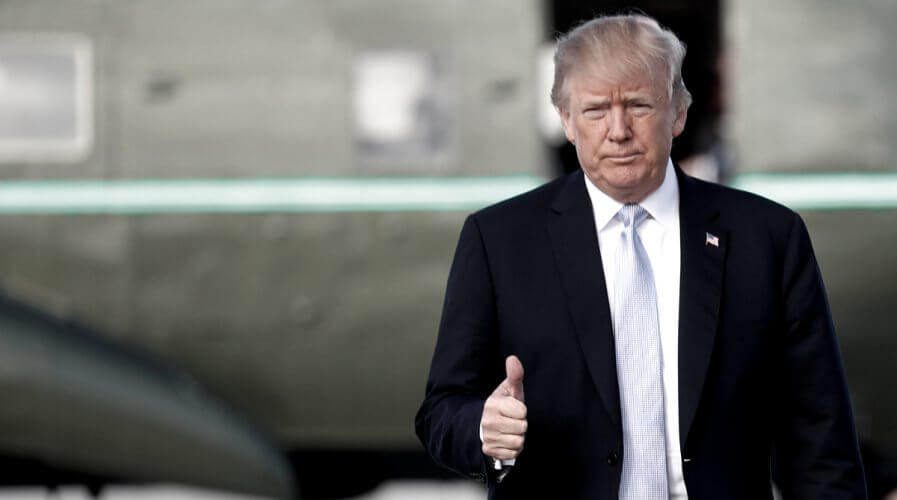
Donald Trump gives a thumbs up as he departs Los Angeles, California. Source: Reuters/Kevin Lamarque
How Trump’s decision impacts APAC telecoms business
MONDAY evening’s announcement by President Donald Trump which blocked the takeover of Qualcomm by Singapore-based Broadcom cited “credible evidence” that suggested the deal would allow Broadcom to take action which “threatens to impair the national security of the United States.”
The Broadcom acquisition of Qualcomm would have represented the biggest deal in the history of the technology industry and was recently suggested to be worth US$117 billion, (although the original figure offered for the US company was, allegedly some billions more).
Qualcomm’s hardware forms the basis of the vast majority of the world’s mobile phones’ connection capabilities, with its system-on-chip LTE technology giving it a de facto monopoly position in the market. Qualcomm gained its dominance during the 3G CDMA rollout and has not looked back.
Broadcom’s proposed takeover caused jitters across the telecommunications industry, as it potentially threatened 5G’s smooth roll-out; boardroom battles are rarely good news for business continuity, or for that matter, stock prices.
Broadcom Withdraws Qualcomm Offer After Trump Rejects Deal
MORE: https://t.co/0m8ESUBY2U#P2 #POTUS
— Prime Politics (@Prime_Politics) March 14, 2018
While this particular battle was played out in the private sector, the situation embodies the technological power struggle of the superpowers, with some seeing the Trump executive order as a thinly veiled statement that non-Americans will not be permitted to dominate the 5G market.
The Qualcomm Snapdragon line of chips used in most mobiles combines cellular modem, RAM, and CPU into a single unit. There is no other viable alternative to smartphone manufacturers, in terms of cost and quality.
The company was recently fined $1.2 billion by the EU for monopolistic, anti-competitive practices, allegedly coercing Apple into accepting it as sole supplier for its iPhone range between 2011 and 2016.
Despite attempts by Broadcom to assuage the American authorities (and press), the Trump order effectively makes the deal dead in the water. Broadcom CEO Hock Tan appeared in November 2017 at the White House, stressing his company’s American roots, and intention to move its headquarters stateside. He said, “America is once again the best place to lead a business with a global footprint. Thanks to you Mr. President, business conditions have steadily improved.”
Trump’s position at that time was quite different, stating:
“Broadcom Limited is a Fortune 100 company, one of the really great, great companies. They manufacture technology and parts. They employ over 7,500 American workers in many states across our country, we’re looking forward to seeing that number grow very substantially, which they’re now anticipated to do. Their move back to the United States and to the United States [sic] is something very, very special and very important.”
As late as March 12, a statement released by Broadcom explained that it “now expects to complete redomiciliation [to the U.S.] by April 3, 2018.”
While the accusations of potential security breaches are so much saber-rattling, the Trump administration does not appear to be shying away from wielding the country’s might in the private sector. The US administration has recently blocked several other Asian deals, including the sale of Lattice Semiconductor to an investment group and the acquisition of MoneyGram by a company connected to Alibaba.
The right move by #POTUS, and long overdue. Makes no sense for #US to practice a onesided free market! https://t.co/vgJmWuFWe1 via @bpolitics
— Z. Alem (@Zfalcon) March 13, 2018
Shortly after the executive order was made public, Broadcom released a terse statement stating, “Broadcom strongly disagrees that its proposed acquisition of Qualcomm raises any national security concerns.”
As reported the day before the presidential edict, in the Wall Street Journal, Intel was considering acquiring Broadcom to prevent the Qualcomm/Broadcom duopoly forming an unstoppable silicon powerhouse. Where Intel’s interest may eventually lead remains difficult to discern.
READ MORE
- Ethical AI: The renewed importance of safeguarding data and customer privacy in Generative AI applications
- How Japan balances AI-driven opportunities with cybersecurity needs
- Deploying SASE: Benchmarking your approach
- Insurance everywhere all at once: the digital transformation of the APAC insurance industry
- Google parent Alphabet eyes HubSpot: A potential acquisition shaping the future of CRM


